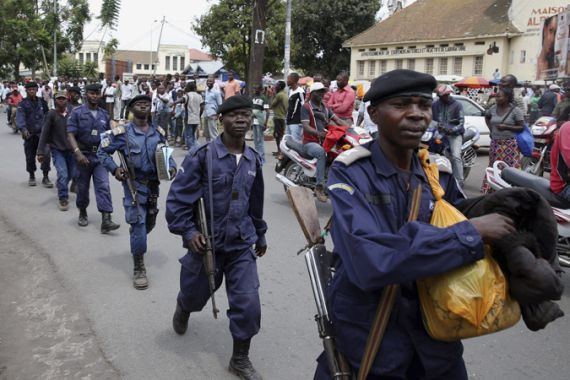DR Congo rebels demand negotiations
M23 vows to retake city of Goma if government does not agree to hold talks with them by Monday.

Rebels in Democratic Republic of Congo have said they will retake the city of Goma if the government does not agree to negotiate with them by Monday.
The M23 rebels completed their withdrawal from the strategic eastern city on Saturday, in compliance with an agreement reached between the group and a regional body.
Bertrand Bisimwa, the spokesman for M23’s political branch, said that by Sunday the rebels have not received information on whether the government had decided to negotiate.
“If negotiations have not started by tomorrow at 2pm, 48 hours since our withdrawal, or if there are attacks on citizens in Goma, we will take back the city,” he said. “We know that President [Joseph] Kabila is not trustworthy, but we want to give a chance for our friends to realise that too.”
The M23 rebels took the capital of North Kivu on November 20, after battling the Congolese army.
Despite the rebels’ retreat from Goma, which was a pre-requisite set by the Congolese government for negotiations, Kabila has not yet made clear if the government will negotiate.
“The head of state said that he will listen to the M23’s grievances and re-evaluate the 2009 peace agreement, and then he will give an answer,” said government spokesman Lambert Mende. “No one will give them the chance,” to return to Goma, he told The Associated Press.
Police deployed
Authorities assumed gradual control of the key area on Sunday, with hundreds of police arriving in the city. About 600 government soldiers are also reported to be on their way to Goma.
But the rebels remain just outside the city, having pledged to withdraw only 20km under the regionally brokered deal.
The eight-month-old M23 rebellion is led by fighters from a now-defunct rebel group, who agreed to lay down their arms on March 23, 2009, in return for being allowed to join the ranks of the Congolese army.
The rebellion, which takes its name from that accord, began in April this year when hundreds of soldiers defected from the military, saying that the terms of the agreement had not been respected.
The rebels have sought the implementation of the 2009 accord, and have also added a list of demands including the liberation of all political prisoners and the dissolution of the current electoral commission which was in charge during fraudulent elections last year.
But most analysts believe the origin of the rebellion is a fight over DR Congo’s vast mineral wealth, a much of which is found in the North Kivu province.